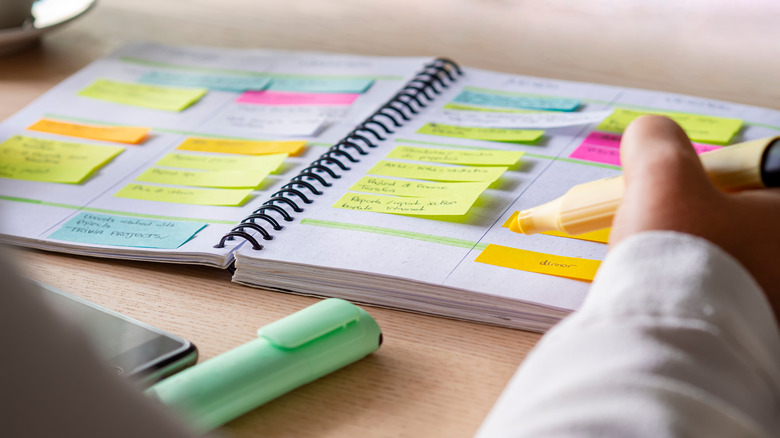How Productivity Can Negatively Impact Mental Health, According To Professor Cassie Holmes
We are approaching that time of year when "being busy" becomes a whole new monster. Between people holiday shopping earlier than ever, seemingly endless social commitments, and looming end-of-the-year deadlines, it can be hard to find a minute of free time for yourself. Even though excessive busyness can lead to exhaustion and burnout, it usually also connotes something positive. Checking things off your list, getting stuff done, and being productive are all good things, right?
Well, not always. Productivity is very much ingrained in the American way of life, as noted by SELF. As a result, it can be hard to distinguish between positive productivity and "toxic productivity." If you find yourself incapable of relaxing and are constantly coming up with new things to add to your neverending to-do list, this may be a sign that your productivity has become unhealthy, per HuffPost.
While there is no behavior that fully captures this phenomenon, it can often be recognized by feelings of shame or "guilt for not constantly doing something," according to mental health experts. In a recent episode of "The Goop Podcast," Gwenyth Paltrow sat down with UCLA business school professor Cassie Holmes to discuss excessive productivity and the negative impact it can have on mental health.
Being too productive can lead to burnout and exhaustion
If you recognize signs of "toxic productivity" in yourself, you're not alone. According to UCLA professor Cassie Holmes, almost 50% of Americans experience a sense of "time poverty," which leads to a relentless, all-encompassing desire to get more done. During an appearance on "The Goop Podcast," Holmes described time poverty as the perpetuating idea that "if only I do more, then I will succeed."
According to Holmes, too much productivity "leads to burnout and depletion, and a sense of exhaustion." The UCLA professor explained that feeling time-poor "makes us less healthy, so less likely to exercise. It makes us less nice or less likely to help others out. It makes us less confident, and our work shows it makes us less happy." Yikes. As it turns out, being too productive may actually have the exact opposite effect of what you intended.
There are several ways to tell if you are truly happy. And, in her own book, "Happier Hour," Holmes discusses the benefits of moving away from constant work and moving towards solely focusing on tasks that are "worthwhile." Before jumping into your next to-do item of the day, Dr. Swody, an expert who spoke with SELF, recommends questioning what your motivations are. "If 'should' creeps into how you think about an achievement ... that's likely a sign external expectations are influencing you," Swody revealed. Thankfully, "Realizing that is an important first step in prioritizing what actually matters to you."

